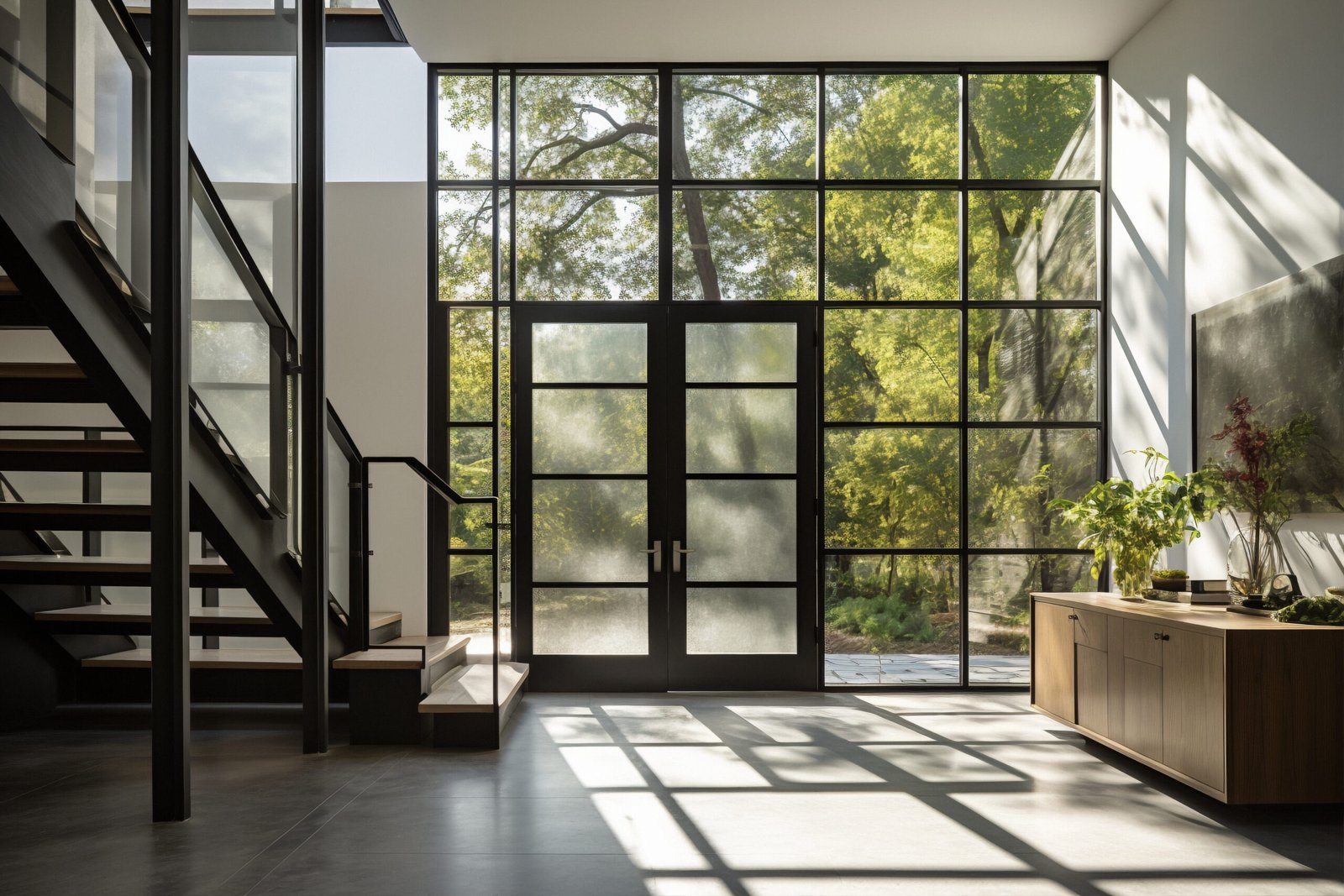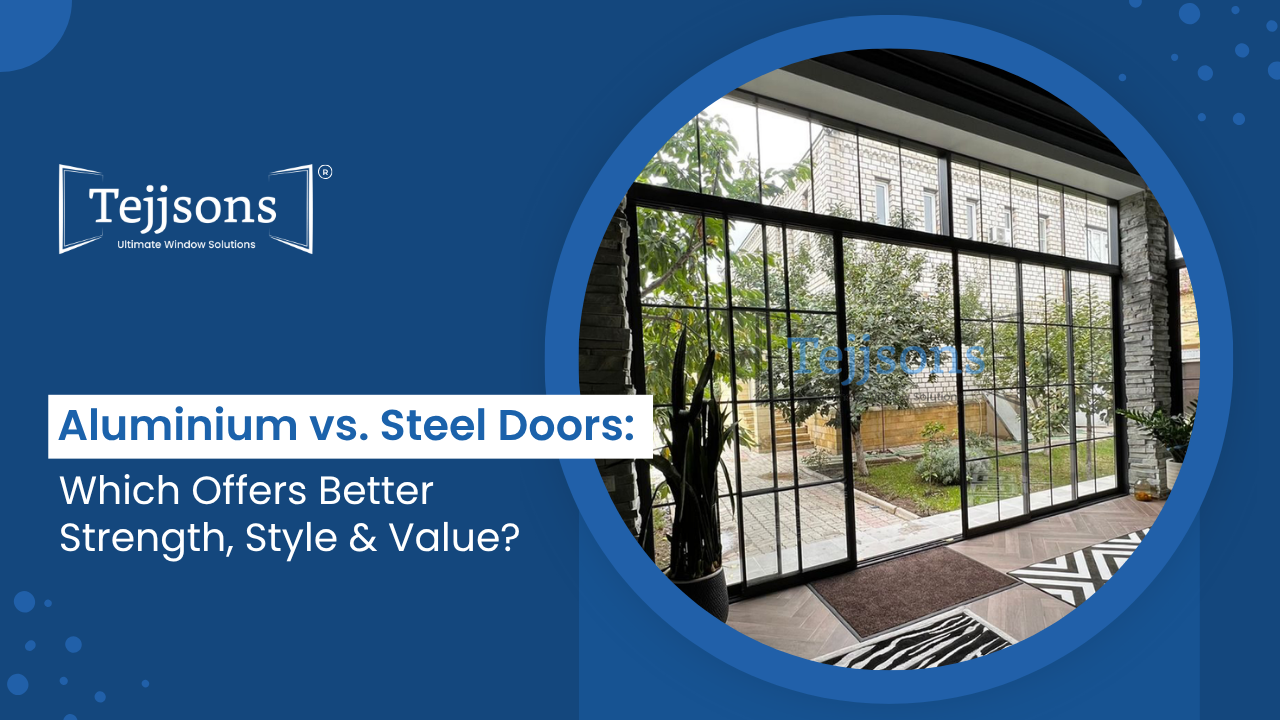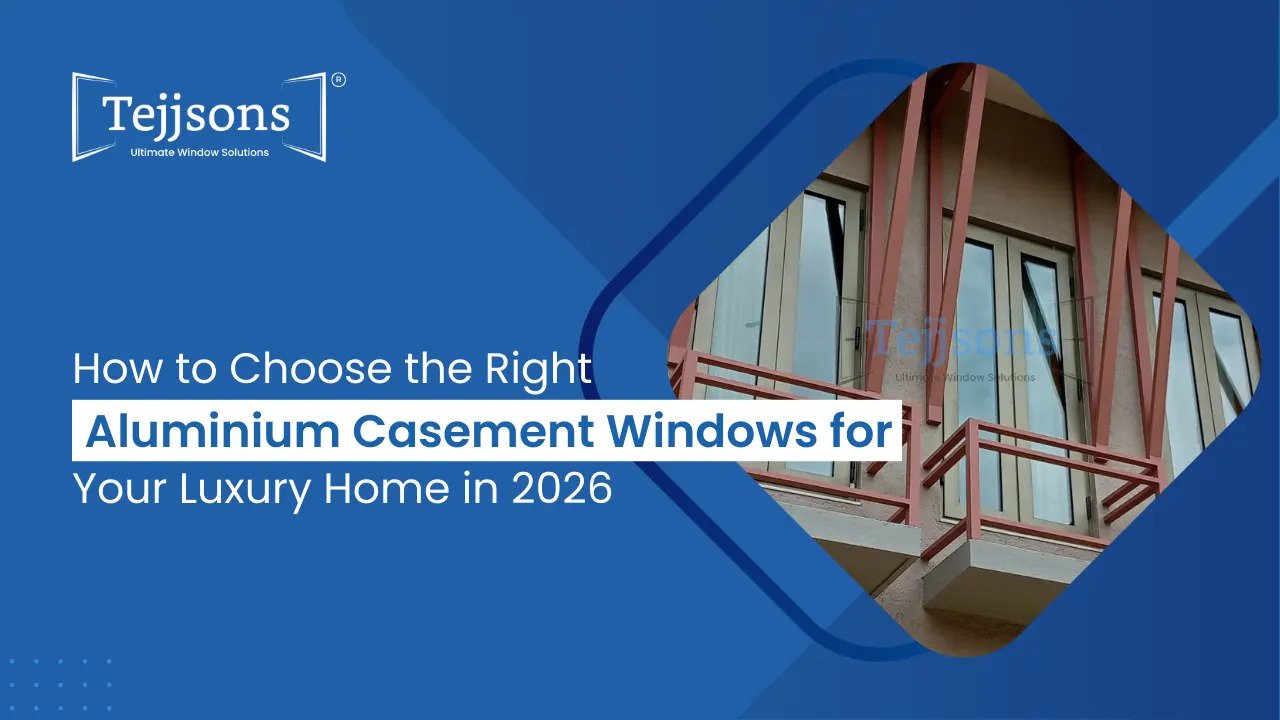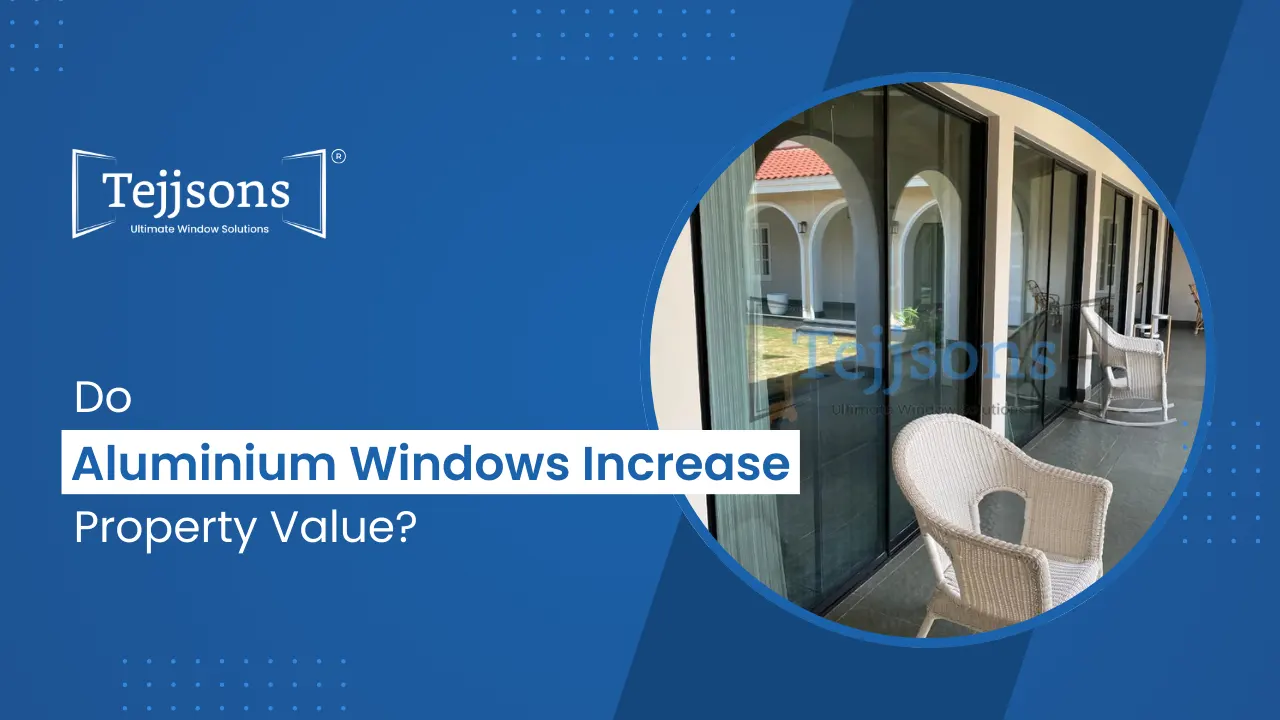Choosing the right door material is more than a construction detail. It’s a design decision that defines the identity, function, and longevity of a space. For architects, interior designers, and builders, doors must meet both aesthetic expectations and practical demands.
In modern architecture, aluminium and steel doors are two of the most trusted choices. Aluminium is known for its slim profiles and clean finish, while steel is valued for its strength and reliability. Each material serves a distinct purpose based on the environment, style, and usage.
This blog compares aluminium vs steel doors across key factors like strength, style, maintenance, and long-term performance so you can make the right call for your space.
Table of Contents
What Are Aluminium Doors?

Aluminium doors are modern, lightweight, and highly durable. Unlike traditional wood or steel options, they are known for their sleek appearance, slim profiles, and resistance to rust, moisture, and warping. These features make them an ideal choice for both interior and exterior applications.
An aluminium home door is especially popular in contemporary architecture, offering a minimalist look while allowing for larger glass areas, natural light, and seamless indoor-outdoor flow. Aluminium frames can also be powder-coated in various finishes, allowing designers to match any style or colour palette.
You’ll find aluminium doors widely used in villas, premium apartments, office buildings, and hotel lobbies, wherever elegance meets performance.
Read more – Luxurious Door Design Ideas That Add Style to Modern Spaces
What Are Steel Doors?
Steel doors are engineered for durability and security. Made from solid steel sheets or steel frames with reinforced cores, they are commonly used in industrial, institutional, and commercial settings. Their strength makes them ideal for high-impact zones such as service entrances, warehouses, factories, and fire-rated areas.
Steel doors are valued for their toughness, fire resistance, and cost-effectiveness, especially in high-traffic or utility-focused environments. With proper coating or galvanization, they can also handle moderate weather exposure.
However, steel tends to be heavier than aluminium, and its design flexibility is more limited. Bulkier profiles and fewer finish options may not align with the visual goals of luxury homes, boutique hotels, or modern office interiors, where aesthetics are as important as performance.
That said, in the proper context, steel doors provide unmatched robustness and long-term reliability, especially where function and security are top priorities.
Aluminium Doors: Pros & Cons

Aluminium doors are commonly used in residential, commercial, and hospitality projects due to their strength, finish options, and compatibility with modern window systems.
| Pros | Cons |
|---|---|
| Lightweight but durable | Higher initial cost compared to steel |
| Corrosion-resistant and weatherproof | May dent under heavy impact |
| Supports larger glass panels and wide openings | Requires thermal break profiles in extreme climates |
| Low maintenance with long-term finish retention | Not ideal for heavy-duty or industrial zones |
| Available in various powder-coated finishes | Less impact-resistant than steel |
| Matches with aluminium tilt and turn windows for full-system design | May not offer the same fire rating as steel in specific applications |
The folding aluminium door is one example of how aluminium door systems can offer wide openings and design consistency in premium spaces.
Steel Doors: Pros & Cons
Steel doors are often used in commercial, industrial, and utility settings due to their strength and cost efficiency. However, they come with limitations when compared to aluminium systems used in design-focused spaces.
| Pros | Cons |
|---|---|
| High strength and impact resistance | Can rust if not properly coated or maintained |
| Generally lower upfront cost than aluminium | Heavier; may require reinforced frames and skilled handling |
| Fire-resistant options available | Limited flexibility in design, colours, and finish options |
| Durable and reliable for industrial and high-traffic areas | Less suitable for modern luxury interiors or design-led projects |
| Strong security performance for service or utility areas | May need more frequent maintenance in coastal or humid environments |
You may also read: Casement vs Sliding Window: Which Is Better for Ventilation
Aluminium Doors vs Steel Doors: Head-to-Head Comparison

Choosing between aluminium vs steel doors depends on several practical factors, especially in design-focused or high-traffic spaces.
Below is a comparison to help you understand the key differences.
| Feature | Aluminium Doors | Steel Doors |
|---|---|---|
| Strength | Strong and reliable for luxury,residential and commercial use | Higher impact resistance, ideal for industrial or security-focused applications |
| Weight | Lightweight, easier to transport and install | Heavier, may require reinforced frames and skilled handling |
| Durability | Naturally corrosion-resistant, ideal for coastal or humid environments | Extremely durable when properly coated; prone to rust without maintenance |
| Design & Aesthetics | Lightweight design profiles, easier to transport, and install | Bulkier profiles, fewer finish options, more suited to functional or utilitarian spaces |
| Maintenance | Low maintenance; does not warp, peel, or rust | Requires regular upkeep to prevent rust and maintain coating integrity |
| Cost | Higher upfront cost but better long-term value in premium projects | Lower initial cost, commonly used in cost-sensitive or industrial applications |
| Thermal Efficiency | Requires thermal break profiles for better insulation | Lightweight, easier to transport, and install |
| Applications | Preferred for luxury homes, hotels, retail, and modern offices | Common in factories, warehouses, service entries, and fire-rated areas |
Slim sliding doors made from aluminium offer a clean look and smoother operation compared to steel alternatives, especially in interior and façade applications.
Read more – Windows and Doors Designs for Modern Luxury Interiors
Aluminium vs Steel Doors: Which Is Better for Luxury Homes, Hotels, and Commercial Spaces?
Aluminium and steel doors serve different purposes depending on the type of space.
1. Luxury Homes
Aluminium doors are commonly chosen in high-end residential projects where design, performance, and comfort come together.
Take a look inside a luxury villa project where Tejjsons aluminium doors bring in light, scale, and quiet sophistication.
Why is aluminium preferred?
- Supports wide openings with minimal frame visibility
- Works well with large glass panels for natural light
- Low maintenance and corrosion-resistant
- Can be customised to match interior and exterior finishes
- Smooth operation with motorized sliding aluminium doors, perfect for modern villas and private residences
- Better energy performance when paired with double glazing or a smart feature
Where steel may be considered: - For security doors at service entries or basement access
- In homes where a solid, industrial-style aesthetic is desired
2. Hotels & Resorts
In hospitality, doors are not just functional; they contribute to the overall guest experience. Aluminium is a smart choice for front-of-house areas where both aesthetics and technology are important while steel used for back of house doors and safety rated zones.
Watch how our systems shape the guest experience in a premium hotel space where design meets function, quietly.
Why aluminium suits hospitality spaces:
- Clean finishes suitable for premium interiors
- Supports remote-controlled door systems for suites or conference rooms
- Allows integration with smart glass-aluminium systems for privacy and energy control
- Quiet, smooth sliding action for guest comfort
- More design flexibility than steel
Steel is suitable for: - Fire-rated zones and service areas
- Back-of-house doors requiring maximum durability and compliance
3. Commercial Buildings
While steel may still be used in back entrances or service zones, aluminium is becoming the standard for customer-facing and architect-designed spaces.
Aluminium is commonly chosen for:
- Customer-facing areas like showrooms, offices, and reception zones
- Automated doors, sliding entrances, and folding systems
- Modern facades where large openings or glass walls are required
Here’s how Tejjsons doors create a clean, seamless look for modern commercial facades and entrances.
Steel remains valuable in:
- Warehouses, industrial zones, and emergency exits
- Areas needing impact protection or specific fire ratings
Interesting Read – Magnetic Levitation for Doors and Windows
Expert Tips: When to Choose Aluminium or Steel?
At Tejjsons, we work closely with design professionals and premium property developers. Based on real-world applications and product performance, here are the reasons when aluminium or steel is most suitable.
Choose Aluminium When:
- The project is in a coastal, humid, or high-exposure climate.
- Uniformity in windows and doors is required across the entire elevation.
- Minimal maintenance is preferred without compromising durability.
- The design features include ventilation and clean lines.
- Integration with automation, smart glass, or motorised sliding systems is part of the plan.
- A high-end architectural finish is essential, especially in villas, hotels, and contemporary commercial spaces.
Choose Steel When:
- Doors are needed for utility areas or back-of-house zones.
- Fire-rated, high-impact, or heavy-duty usage is the priority.
- A project is highly cost-sensitive with a limited focus on façade or interior aesthetics.
- The installation is indoors with no exposure to weather or moisture.
Watch how real-world projects reveal where aluminum truly stands out in finish, function, and long-term value.
You Might Also Like
- 5 Tips to Choose the Right Aluminum Doors & Windows
- Why Aluminium Windows and Doors Are Perfect for Indian Homes
Conclusion
Choosing between aluminium and steel doors comes down to the needs of your space. Steel may work well for industrial or back-end areas. Still, aluminium is the preferred choice for modern homes, luxury villas, hotels, and commercial buildings where design, durability, and technology matter.
Aluminium systems offer clean finishes, low maintenance, and the flexibility to support smart features, automation, and seamless glass integration. As a trusted aluminium door manufacturer, Tejjsons provides advanced solutions such as fold and slide doors, sliding telescopic doors, and Magnetic Levitation Systems designed to balance performance with style.
If you’re looking for doors that elevate both form and function, explore our full range of aluminium systems tailored for modern architecture and lasting value.
FAQs
1. Which Is More Durable, Aluminium or Steel Doors?
Both are strong, but aluminium doors and frames offer better resistance to corrosion and weather over time. This makes them a more durable choice for luxury and commercial projects.
2. Do Aluminium Doors Require Less Maintenance?
Yes. Aluminium doors for the home need very little upkeep. They don’t rust, don’t warp, and retain their finish for years, even in harsh weather conditions.
3. Can Aluminium Doors Be Used Outdoors?
Absolutely. A well-designed aluminium home door is ideal for outdoor use, including balconies, terraces, and main entrances. Reach out to Tejjsons for custom outdoor aluminium door options.
4. What Are The Most Stylish Options For Luxury Spaces?
From fold and slide doors to sliding telescopic doors, aluminium offers slim profiles and flexible designs perfect for modern homes, hotels, and offices. Tejjsons offers systems tailored for high-end interiors.
5. What Are The Advantages Of Aluminium Doors Over Steel doors?
When comparing aluminium doors vs steel doors, aluminium is lighter, more weather-resistant, and supports modern features like automation and glass integration.
6. What Is The Lifespan Of An Aluminium Door?
A well-installed door from a trusted aluminium door manufacturer can last 30–40 years with minimal care. Contact us at Tejjsons to learn about warranty and care recommendations.





